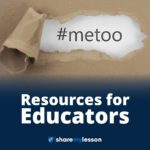The 150th anniversary of the District of Columbia Compensated Emancipation Act of 1862
occurred in 2012. This bill was introduced to Congress to end slavery in the District of
Columbia. Many citizens and members of Congress alike noted that the legality of slavery in
the District of Columbia was inconsistent with the ideals and aspirations of the nation. Congress
approved the bill, and President Abraham Lincoln signed the act.
This activity features the District of Columbia Compensated Emancipation Act of 1862 and
other primary and secondary sources that tell the story of Congress’s role in this first major step
toward the freeing of enslaved African Americans. While intended for 8th grade students, the
lesson can be adapted for other grade levels.
IRL 1: Free Speech in Schools Podcast
We’re digging into four incredibly important Supreme Court cases – four cases that have shaped how we interpret the meaning of free speech in public schools. Is political protest allowed in class? Is lewd speech covered by the First Amendment? Can school administrators determine what students can and can’t say in the school newspaper? Listen in, and find out how students and schools have gone head to head over how First Amendment rights apply in a public school setting.
Constitution Day Writing Prompts – Middle and High School
Three writing prompts for Constitution Day are provided for middle school and high school. The prompts can be used as a formal essay, at writing stations, or as a “discuss and write.”
Civic Art Project: Notes on the Constitution
Students create art works based on an examination of the language of the Constitution and the personal connections they make. These art works will incorporate words, illustrations, and mixed media images.
This lesson can be adapted for different grade levels. High school students can use an abridged version of the U.S. Constitution. Elementary and middle school students can use the Preamble, or introduction, to the Constitution.
Civic Art Project: From Her Beacon
Students will work collaboratively to create a mural of the Statue of Liberty to show the statue as a representation of freedom and a symbol of welcome to immigrants coming from other countries. This lesson can be adapted for different grade levels. High school students will read a poem and incorporate some of its ideas into their mural. Elementary and middle school students will incorporate words and phrases inspired by the statue into their mural. This activity supports Art, Social Studies, Civics, and English Language Arts standards and can be used as a cross-curricular project across these classrooms. Teachers across the curricula are encouraged to work together to bring this activity to life.
U.S. Capitol Tour, Worksheet, Quiz – Middle School
This 3-room video tour of the U.S. Capitol, featuring the Crypt, Rotunda, and National Statuary Hall, focuses on information relevant to students taking middle school level U.S. history and civics courses. A follow-along worksheet and a follow-along quiz are provided.
Bullying and Speech Policies in Your School and Community
Students use a poem to discuss bullying and then explore policies within their school, community, and state.
Our Rights
The book Our Rights, written by David J. Bodenhamer, uses historical case studies to explore the rights in the Constitution. Supreme Court cases are used to demonstrate how a right received its modern interpretation, how the right applies today, and how courts and other interpreters seek to balance this right with important societal concerns such as public safety. The complete book or individual chapters can be downloaded.
The Pursuit of Justice
The Pursuit of Justice book, written by Kermit L. Hall and John J. Patrick, analyzes 30 Supreme Court cases chosen by a group of Supreme Court justices and leading civics educators as the most important for American citizens to understand. An additional 100 significant cases included in state history and civics standards are summarized. The complete book or individuals chapters can be downloaded.
The Me Too Movement: Resources for PreK-12 Teachers and School Staff

The #MeToo and #MeTooK12 movement is an opportunity for schools to reflect on how to address issues of consent, sex education, relationships and undoing a pervasive culture of silence. April is also Sexual Assault Awareness month. The Share My Lesson team curated a collection of free resources to help educators with critical conversations and lesson planning, as well as school procedures and policies and opportunities for reflection.